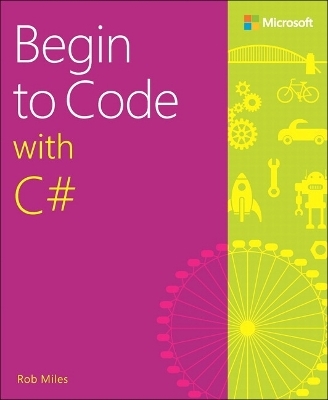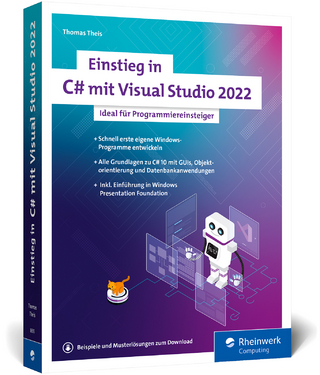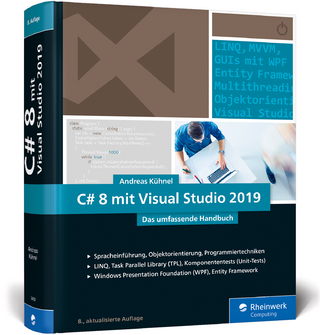
Begin to Code with C#
Microsoft Press (Verlag)
978-1-5093-0115-7 (ISBN)
Start writing software that solves real problems, even if you have absolutely no programming experience! This friendly, easy, full-color book puts you in total control of your own learning, empowering you to build unique and useful programs. Microsoft has completely reinvented the beginning programmer’s tutorial, reflecting deep research into how today’s beginners learn, and why other books fall short. Begin to Code with C# is packed with innovations, from its “Snaps” prebuilt operations to its “Make Something Happen” projects. Whether you’re a total beginner or you’ve tried before, this guide will put the power, excitement, and fun of programming where it belongs: in your hands!
Easy, friendly, and you’re in control! Learn how to...
• Get the free tools you need to create modern programs
• Work with 150 sample programs that illustrate important concepts
• Use the sample programs as starting points for your own programs
• Explore exactly what happens when a program runs
• Approach program development with a professional perspective
• Use powerful productivity shortcuts built into Microsoft Visual Studio
• Master classes, interfaces, methods, and other essential concepts
• Organize programs so they’re easy to construct and improve
• Capture and respond to user input
• Store and manipulate many types of real-world data
• Create interactive games that are fun to play
• Build modern interfaces your users will love
• Test and debug your code—and avoid problems in the first place
Rob Miles has spent more than thirty years teaching programming at the University of Hull in the United Kingdom. He’s a Microsoft MVP, with a passion for programming, C#, and creating new things. If he had any spare time, he’d spend it writing even more code. He loves making programs and then running them to see what happens. He reckons that programming is the most creative thing you can learn how to do. He also reckons that in a battle between us and the Martians, we’d win, because we’ve got Visual Studio and they don’t–and there isn’t anything better in the universe for building software. He claims to know a lot of really good jokes, but nobody has ever heard him tell one. If you want an insight into the Wacky WorldTM of Rob Miles, you can read his blog at www.robmiles.com and follow him on Twitter via @RobMiles.
Contents Introduction Part 1: Programming fundamentals 1 Starting out Building a place to work Getting the tools and demos Using the tools What you have learned 2 What is programming? What makes a programmer? Programming and party planning Computers as data processors Data and information What you have learned 3 Writing programs C# program structure Identify resources Start a class definition Declare the StartProgram method Set the title and display a message Extra Snaps Creating new program files Extra Snaps Creating your own colors What you have learned 4 Working with data in a program Starting with variables
Using a variable in a program Working with numbers Working with different types of data Whole numbers and real numbers in programs Extra Snaps What you have learned 5 Making decisions in a program Understanding the Boolean type Using if constructions and operators Creating blocks of statements
Creating complex conditions using logical operators Adding comments to make a program clearer Funfair rides and programs Working with program assets What you have learned 6 Repeating actions with loops Using a loop to make a pizza picker Performing input validation with a while loop Using Visual Studio to follow the execution of your programs Counting in a loop to make a times-table tutor Using a for loop construction Breaking out of loops Going back to the top of a loop by using continue Extra Snaps What you have learned
7 Using arrays Have an ice cream Making an array Multiple dimensions in arrays Using arrays as lookup tables What you have learned Part 2: Advanced programming 8 Using methods to simplify programs What makes a method? Making a tiny contacts app Adding IntelliSense comments to your methods What you have learned 9 Creating structured data types Storing music notes by using a structure Objects and responsibilities: Making a SongNote play itself Making a drawing program with Snaps Creating enumerated types Making decisions with the switch construction Extra Snaps What you have learned 10 Classes and references Making a time tracker Structures and classes From arrays to lists
Storing data using JSON Fetching data using XML What you have learned 11 Making solutions with objects Creating objects with integrity Managing the object construction process Saving drawings in files What you have learned
Part 3: Making games
12 What makes a game?
Creating a video game
What you have learned
13 Creating gameplay
Creating a player-controlled paddle
Adding sound to games
Displaying text in a game
What you have learned
14 Games and object hierarchies
Games and objects: Space Rockets in Space
Designing a class hierarchy
What you have learned
15 Games and software components
Games and objects
What you have learned
| Erscheinungsdatum | 04.10.2016 |
|---|---|
| Verlagsort | Boston |
| Sprache | englisch |
| Maße | 188 x 226 mm |
| Gewicht | 840 g |
| Themenwelt | Informatik ► Programmiersprachen / -werkzeuge ► C# |
| Informatik ► Software Entwicklung ► Objektorientierung | |
| ISBN-10 | 1-5093-0115-1 / 1509301151 |
| ISBN-13 | 978-1-5093-0115-7 / 9781509301157 |
| Zustand | Neuware |
| Haben Sie eine Frage zum Produkt? |
aus dem Bereich


